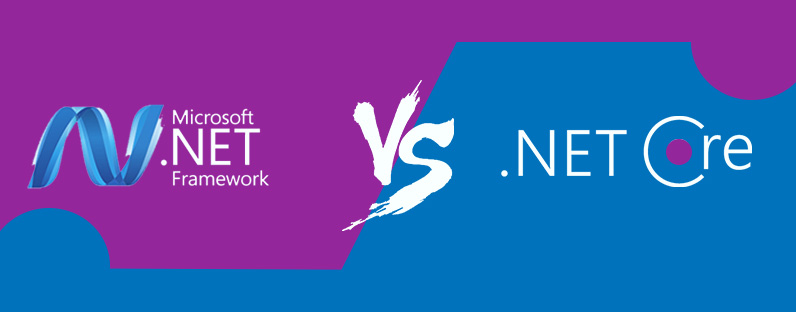.Net Framework is a software development framework designed and maintained by the tech giant Microsoft. It is primarily Windows-based and is used for the development of standalone desktop as well as web applications development. The framework provides all the basic requirements for the development of applications – UI, DB connectivity, Services, APIs, etc.
.Net Core, on the other hand, is a platform and not a full-fledged framework. Simply put, .Net Core is a subset of the .Net Framework.
The decision to build the .NET Core and the .NET framework depends on the type of application, specifications, budget and platform to be built. However, there are some of the factors that must be considered for your next project. This post will draws light on the difference between .Net Core and .Net Framework. It will also guide you in choosing the one that suits your software development requirements.
Table of Contents
ToggleWhat is .NET Core?
.NET Core is a popular open-source, cross-platform framework. It has been developed by Microsft and used for building mobile apps, web apps, and web services. Some of the main .NET Core benefits for mobile app development are:
- Cross-platform – You can reuse code across iOS, Android, and Windows. This means less time spent developing the same features for different platforms.
- Modular architecture – .NET Core has a modular design that results in smaller app sizes and improved performance.
- Native experience – Although you’re using a shared codebase, .NET Core allows you to leverage native APIs and UIs on each platform.
- Continuous updates – Microsoft frequently updates .NET Core, providing new features, security patches, and performance enhancements.
.NET Core is a robust framework that maximizes code reuse and collaboration. It is an excellent choice for mobile app development using a single, shared C# codebase.
What is .NET Framework?
The .NET Framework is Microsoft’s original library and runtime for building apps on Windows. It comes bundled with a huge class library to help you build just about anything. Some of the major parts are:
- The Common Language Runtime (CLR) compiles your code and runs it.
- The Framework Class Library (FCL) with thousands of classes to build on.
- Languages like C# and Visual Basic that compile into .NET bytecode to run on the CLR.
.NET Framework vs. .NET Core: Which is better?
Both are powerful frameworks, yet there are some key differences to know.
| .Net Framework | .Net Core |
| Runs only on the Windows operating system. | Runs on Windows, Mac, and Linux platforms. |
| Ideal for traditional desktop and internal business web applications development. | Designed for mobile app development and cloud applications. |
| Requires a large installation size (around 500 MB). | Lightweight and modular, allowing installation of specific components. |
| Continues to be supported for legacy desktop apps. | Considered the future of .NET development. |
| Built on Microsoft’s established stack. | Provides flexibility and compatibility across multiple platforms. |
If you want platform-independent apps, .NET Core is the clear winner. .NET Framework only supports Windows.
.NET Core was built to be fast and modular. It has a smaller API and memory footprint than the .NET Framework .NET Core also supports side-by-side versioning. If you have an existing app built on .NET Framework, it may be easier to stick with what you know. However, many popular libraries now work with both .NET Core and .NET Framework.
.NET Framework supports more web applications development project types out of the box. But the .NET core is equally impressive because of the tons of third-party libraries.
While both frameworks are optimized for building robust enterprise software and mobile apps, for cross-platform apps, .NET Core is probably the better choice. But if you have an existing .NET Framework app or need to use certain project types, the full .NET Framework is a great option.
Why is .NET Core faster than the .NET framework?
Unlike .NET Framework .NET Core has a modular design so you only need to install the parts you want. This gives it a smaller footprint and a faster startup time. Having access to the source code means the community can help improve .NET Core, and you have more control and flexibility.
.NET Core is updated more frequently with the latest features and improvements. It has better support for modern web frameworks and includes the latest C# language features.
- Simpler Architecture:
- .NET Framework requires to be installed as a single Windows program and runtime framework.
- But .NET Core is cross-platform and needs to be packaged and installed independent of the underlying operating system. The developers are required to compile Nuget packages included in .NET Core. Also, they can compile the Nuget packages directly into the application or place them in a folder inside the application.
- Library collection:
- The .NET Framework can take advantage of robust class libraries. These class libraries implement many common functions, such as file reading and writing, graphical rendering, interaction with databases, and manipulation of XML documents.
- .NET Core can even take advantage of robust class libraries, but it even uses a redesigned common language runtime called CoreCLR, where developers have the choice to pick and use only the libraries that are required for the application and can remove unnecessary libraries.
- Cross-Platform Compatibility and Open Source:
- .NET Framework enabled developers to build applications on a single platform – Windows..NET Framework was released as a licensed and proprietary software framework. Microsoft subsequently made certain components of the .NET Framework open-source.
- .NET Core is a cross-platform which means it is compatible with the various operating systems – Windows, Linux, and even Mac Platforms. The company released .NET Core as a platform for open-source applications. Therefore, with. NET Core, both enterprise and individual developers can build apps without paying any licensing fees.
- Deployment Model:
- .NET Core offers a flexible deployment model. Whenever any latest version of .NET core gets launched, it can be instantly updated on one machine and thereby gets uploaded in new directories without affecting the existing app. Moreover, applications can be directly deployed in the cloud, or developers can even self-host the application by creating their hosting process.
- In .NET Framework, developers have to deploy web applications only on the Internet Information Server. However, it has the option of Xcopy deployment- which can copy your files into the directory where they’re ready to run. This works great for the simple applications but for the complex apps, it requires more steps to be fully deployed on the server.
Also Read: PHP v/s ASP.NET: Which is better language for Website Development?
- Performance and Scalability: If performance and scalability are important, which architecture is the best .NET Core or .NET?
- .NET Core is more powerful than the .NET framework, as developers can dramatically improve device efficiency without using additional hardware. The code compiled in the .NET core is automatically optimized without any modification. The recompilation feature in .NET core optimizes the code directly, thereby increasing the performance. Moreover, it enables the developers to build, test, and deploy the applications directly in the cloud. Thus, with the help of .NET core, developers can increase the performance and scalability of the applications hassle-free.
- .NET framework lags in performance and is not faster, versatile, and more efficient and secure. The .NET framework compiles the CIL code into executable code using its just-in-time compiler when an application is initially launched and caches the executable program into the .NET Native Image Cache. To speed up the first launch, developers may use the Native Image Generator utility to manually compile and cache any .NET application.
- Mobile App Development:
- .NET Framework does not provide any comprehensive framework or tools for easing the development of mobile apps.
- .NET Core with Xamarin is compatible through the .NET standard library. Hence, developers can take advantage of Xamarin to write cross-platform mobile apps in C# with a shared code base and the same set of APIs. They can further use the tools provided by Xamarin to customize the mobile app for individual mobile platforms like iOS, Android and Windows Phone.
- Modular Collection of Libraries:
- .NET Framework and .NET Core allows developers to take advantage of robust class libraries.
- But .NET Core uses a redesigned common language runtime called CoreCLR and features a modular collection of libraries called CoreFX. Hence, the developers have the option to pick and use only the libraries required by each application and enhance the application’s performance by removing unnecessary libraries.
Overall, .NET Core is a more modern, flexible, and lightweight framework option compared to the .NET Framework. The latter still has its place for existing web applications development, but for mobile development, .NET Core reigns supreme.
Also Read: Why ASP.NET Core is the Best Framework for Web App Development










